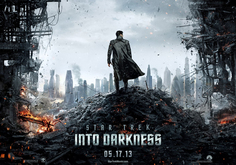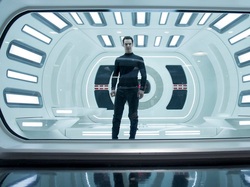
Director: J.J. Abrams
Starring: Chris Pine, Zachary Quinto, Benedict Cumberbatch, Zoe Saldana, Alice Eve and Peter Weller
Review Written by: Leonhard Balk (Minister for History)
"Is there anything you would not do for your family?"
There is a scene in Star Trek Into Darkness, set during the much advertised ship-falling climax of the film, in which Captain Kirk (Chris Pine) tries to repair his ship by repeatedly kicking the machinery inside the warp drive. The image of the Starfleet Captain relentlessly throwing his body against the massive machine strikes me as the perfect summary of the Kirk character, and a telling metaphor for describing the appeal behind the adventures of the U.S.S. Enterprise.
Back in 2009, when J.J. Abrams' revival of a disesteemed, over 40-year old franchise first opened in cinemas, nobody expected it to resonate with people the way it did. Star Trek had fallen out of favour, both as a series of films and as a long-running TV show. Star Trek: Nemesis (2002) made less than any previous Star Trek outing, grossing a mere $43 million domestically, and temporarily stalled the character of then unknown actor Tom Hardy. After it's brief renaissance period in the 90s, kickstarted by Star Trek: The Next Generation, Gene Roddenberry's classic series seemed about ready to settle down into the archives of sci-fi fandom. Then along came Abrams, fresh of his debut directing feature and still riding the Lost wave, who openly admitted to not being a fan of the original show. Maybe this is part of the reason why he was chosen for the job.
His 2009 film introduced new audiences to Kirk and Spock, characters famously portrayed by William Shatner and Leonard Nimoy in the original, with actors Chris Pine and Zachary Quinto taking over the mantle. In these two characters, their outcast backgrounds and emotional struggles, Star Trek had found it's emotional core. More importantly though, by grounding these nearly half a century old characters in relative reality, and exploring their shared beginnings, Abrams was able to change the expectations surrounding Star Trek films. Suddenly, Trek could be mentioned along the likes of Batman Begins, Spider-Man and The Lord of the Rings: films which took the comical or nerd-specific source material and pudhed it into the mainstream, giving the hero's story emotional weight and real world relevance. With writers Roberto Orci and Alex Kurtzman deciding to establish a definite split from the very familiar storyline of the original series by setting up a parallel universe, freeing the crew of the Enterprise from any obligations made for them by the series, the future for the Star Trek franchise looked very bright indeed.
Four years later, we now finally get the continuation of Abrams' new space adventures. And immediately, the first thing you notice is the strength of the characters. It seems like not a day has passed since the original, like we only just left the Enterprise for a quick planetary excursion. Scottish Simon Pegg is still brilliant as Scotty. Karl Urban's take on 'Bones' McCoy is just as funny. Zoe Saldana's Uhura is again both strong and sympathetic. The main attraction, however, still lies in the Kirk-Spock relationship.
Kirk finds himself demoted to first officer and watches as terrorist John Harrison (Benedict Cumberbatch) attacks Starfleet headquarters. Spock faces obstacles of similar danger in dealing with his relationship with Uhura and coming to terms with human emotions.
In Cumberbatch's villain, the crew has undeniably found it's greatest advisory. He is super strong, intelligent, and equipped with knowledge about Starfleet's past. Returning writers Orci and Kurtzman try to pull of the glass-cage interrogation for a third time (after Skyfall and the Avengers), but fail to create a memorable exchange. Cumberbatch's performance is icy cold and calculating, his voice cracks with emotion at just the right beats, yet something is still missing. Somehow, his villain, whose real identity I'm still not sure I should reveal, doesn't feel as angry and hurt as he should. Maybe it's the fact that he isn't set up as strongly as Eric Bana's 2009 villain Nero. Or maybe, it's the tedious series of punch outs and action set-pieces that get in the way. Let me explain:
At it's most effective, Into Darkness poses serious moral questions about humanity in the age of space exploration. Something which the TV show also explored with regularity. These are the scenes I remember from watching the various incarnations of the show: The Enterprise is confronted by a larger and more powerful ship. This enemy is mostly representative of some wronged planet, a dark secret from the captain's or Starfleet's past. Now, the fun is over, exploration has had it's toll. The crew have lost the ability to flee this confrontation and can only survive by skillful negotiation. In the end, the captain must make the morally right decision, protecting familiar human laws in the alien vastness of space, accepting the consequences.
Into Darkness certainly shares these moral ambitions with the show. Scenes in this vein, where everything falls into place and Kirk's morality triumphs regardless of the danger, are examples of great science-fiction cinema. However, these scenes are few and far between, with the majority of the film dedicated to chasing and punching Cumberbatch's nearly invincible terrorist. Maybe Abrams was caught up practising for his Star Wars directing gig. Or maybe, he is simply unwilling to go completely into the show's universe.
At one point in the film Scotty points out his discomfort at the fact that the Enterprise, an exploration vessel, is being militarised for a combat mission. This is what could be said about the approach behind the whole film. Abrams gets too caught up in the film's big action pieces to realise that he has strayed too far from the ambitions of the source material.

Rating: 7/10
 RSS Feed
RSS Feed
